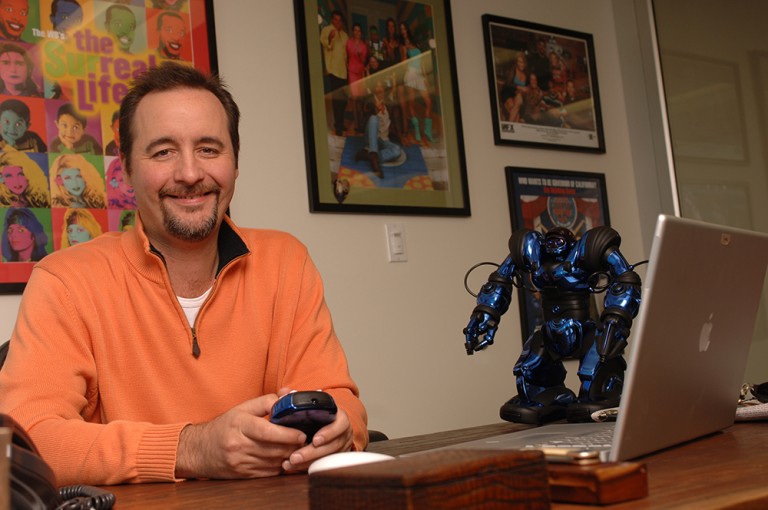If you’ve ever caught yourself lounging on the couch obsessively watching what happens to a seemingly everyday character on your favorite reality TV show, then you should probably know the name Mark Cronin, who I recently interviewed. He is the wildly successful reality television producer, best known for creating the “celebrity-reality” genre that has taken the entertainment industry by storm.
He is the creative genius and founder of Little Wooden Boat Productions, the famed company currently producing the game show Idiotest on GSN (Game Show Network), and Mark himself is the Executive Producer behind Below Deck, and its spin-off, Below Deck Mediterranean, both aired on Bravo.
But Mark Cronin wasn’t always a manufacturer of reality-mirroring entertainment. In fact, originally he went to school and worked for five years as an engineer in his early twenties. It was during those early, formative working years that he realized he needed to be doing something creative. To let Mark tell it, “Honestly, I didn’t care. It could have been music. It could have been advertising. It could have been comedy, or playwriting, photography, anything. I just didn’t want to live the quantitative life of being an engineer.”
Oddly enough, Mark Cronin ended up “engineering” one of the most tried-and-true models in television, by deliberating sculpting characters, plots, and dramatic scenes to astoundingly resemble the conflicts people relate to most in everyday life.
Mark went on to share how he benchmarks success in the industry today, and how he continues to give audience members what they want.
“It comes down to expectation,” he said. “When someone sits down to watch Game of Thrones on HBO, they expect production value. But when someone watches reality television, they judge it through a very different lens. It’s not always about production quality. People just want a true story. They want what’s real. They want to see themselves in what they’re watching, and recognize the situations they are watching in how they relate to their own lives. And we, as producers, have to continue pushing the boundaries so that we don’t continue creating what’s been done or is expected.”
Building on that, Mark explained that even with shows like Below Deck, highlighting what it’s like to work on a super yacht in a far-from-everyday-life setting, what makes it relatable are the interpersonal conflicts and human realities. Audience members watch to find out what happens between characters and dynamics, they watch for the universal themes.
“It’s about seeing how these characters get along with their coworkers, or deal with their overbearing boss, or how they get away with something they shouldn’t have gotten away with, etc. It’s these situations that people can relate to, either in their own individual workplace, or within their family, their group of friends, that makes the audience respond and want to continue watching,” said Mark. “They want to see themselves in the characters.”
The best example of how Mark deliberately engineers entertainment for his audiences can be exemplified through his show, Below Deck.
In Mark’s words, “It’s a stacked deck—but once the deck is stacked, we let the game play itself out.”
Before beginning to film the show, Mark does his homework. He can’t just go on a boat and start shooting whatever crew happens to be on that boat. So he deliberately puts together a crew of individuals that will allow for serendipitous entertainment. For Below Deck, for example, he knew that some of the crew members were experienced, and some weren’t. He knew some were hot-headed, and some were more passive and calm. Everyone is good looking. Many are (intentionally) single, leaving far more room for spontaneous drama. All these tiny elements go into Mark’s careful character selection, and when left to their own devices tend to produce material worth filming.
Whatever happens, happens.
Lastly, Mark makes it a point not to try telling cast members who to be. He doesn’t want to be in their heads and have them thinking about how they’re going to be perceived, or how they’re going to look on camera. He wants them to forget about the cameras—and he does this by filming non-stop. That’s the technique he’s used to turn Below Deck into a success.
“We never stop shooting. We shoot for six weeks. We get all our episodes in that period of time. We shoot every day, from the moment they get up to the minute they go to bed. And within three days, they inevitably forget that they’re even on television, and stop worrying about it. The cameras just become part of their everyday lives—and in turn, they as characters become far more real.”
Opinions expressed here are opinions of the Author. Influencive does not endorse or review brands mentioned; does not and cannot investigate relationships with brands, products, and people mentioned and is up to the Author to disclose. Accounts and articles may be professional fee-based.

